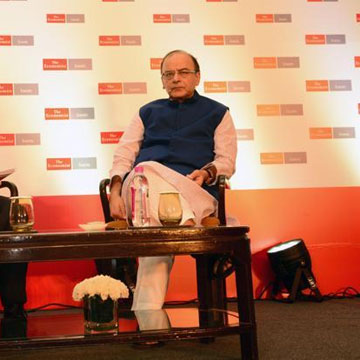 New Delhi:
New Delhi: Would India miss the 1 April deadline for the roll-out of the goods and services tax (GST)? Finance minister Arun Jaitley doesn’t rule it out.
Speaking at the India Summit organized by The Economist, Jaitley said that though GST continued to be top priority there were challenges to be overcome before its implementation.
“It (1 April) is a very stiff target. We are running against time. But I would certainly like to give it a try,” said Jaitley.
The constitution amendment bill for GST, which received Parliament’s nod last month, has been ratified by more than 50% of the states.
The Parliament secretariat is currently compiling details from the state assemblies, after which the bill will be sent to the President for his assent. Thereafter, the government will notify the bill and constitute the GST council—the representative body compromising the Union finance minister and state finance ministers.
The council will finalize GST laws, the provisions of which include contentious issues such as tax rates under GST and division of administrative control between the centre and the states.
“We have the months of September, October and part of November to finalize the laws,” Jaitley said, adding that eventually, the tax rates will be finalized.
An expert struck a more optimistic note.
“So far, the government is on track to meet the 1 April deadline. The constitution amendment bill has been ratified ahead of schedule,” said R. Muralidharan, senior director at Deloitte India.
“But for some unforeseen issues like a delay in the decision on the tax rates, I do not see any reason for missing the deadline,” he said.
“Of course, the industry will like to get around four to six months to prepare for GST’s roll-out,” he added
Mint learns that the government may introduce the supporting legislation for GST as money bills in Parliament. If it does so, then the Rajya Sabha, where the National Democratic Alliance is in a minority, cannot make changes to the bills, thus ensuring that the government’s legislative agenda will not be derailed.
The definition of money bill does specify that bills dealing with taxation matters can be classified as a money bill.
During discussions on the constitution amendment bill in the Rajya Sabha, MPs belonging to opposition parties sought an assurance that the supporting GST laws will not be tabled as a money bill. However, Jaitley said it was not possible to do so without knowing the final contents of the bill.
GST is a singular tax reform that will remove barriers across states and integrate the country into a common market. It will replace multiple indirect taxes levied by the centre and the states including excise duty, service tax, value-added tax, entertainment tax, entry tax and luxury tax.
Jaitley pointed out that the tax rates under GST should ensure that finances of the centre and the states are protected, without burdening the common man.
“There are obviously some pending issues which the council will have to resolve. If we are able to successfully transcend those issues, then in the winter session, the legislations can be passed,” he added.
Jaitley also listed improving the health of state-run banks as one of the main priorities of the government, but said that public opinion doesn’t favour privatizing these banks.
Effectively ruling out privatization of state-run banks, Jaitley said, “India still realizes that these banks have an important (national) role to play. In a consolidated manner, they will continue in the current shape”.
Commenting on the latest GDP numbers (7.1% in the first quarter of 2016-17) Jaitley said a 7.5% growth is below India’s potential and increased government spending and a good monsoon should work in India’s favour.
“We are looking for a much better tomorrow. Domestic demand will increase. The situation will give some scope to the private sector to improve its investment.” #Source: The Mint
 New Delhi: Would India miss the 1 April deadline for the roll-out of the goods and services tax (GST)? Finance minister Arun Jaitley doesn’t rule it out.
New Delhi: Would India miss the 1 April deadline for the roll-out of the goods and services tax (GST)? Finance minister Arun Jaitley doesn’t rule it out.